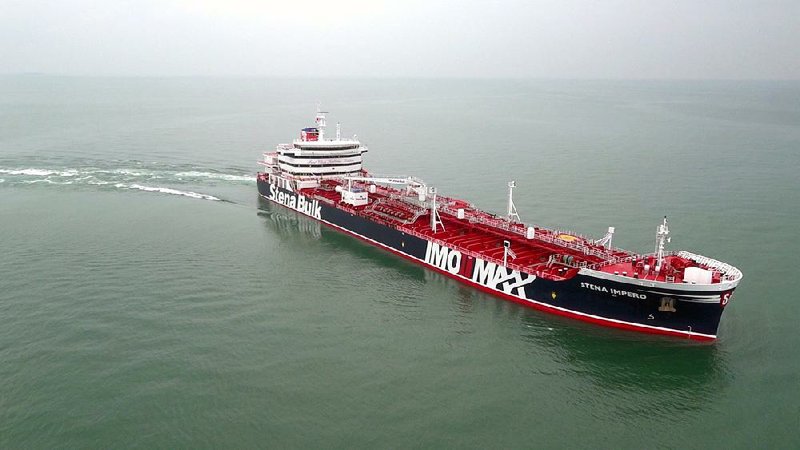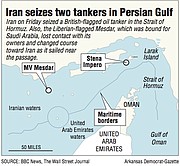LONDON -- Iran said on Friday that it had seized a British oil tanker in the Persian Gulf, and the tanker's owner said it had lost contact with the vessel as it appeared to be heading toward Iran. The British government said it was urgently seeking information about the incident.
The seizure of the ship, the Stena Impero, in the Strait of Hormuz, was the latest episode in three months of escalating tensions between Iran and the West. It came a day after the United States said it had downed an Iranian drone in the area, which the Iranians denied.
Britain and Iran have been embroiled in a dispute for the past few weeks over Britain's seizure of a tanker carrying Iranian crude oil near Gibraltar. Iran had vowed to retaliate.
British Foreign Secretary Jeremy Hunt said a second ship was seized Friday in the Strait of Hormuz.
The owner of the Liberian-flagged tanker later said the ship was briefly boarded by armed guards before being allowed to go. Iran's semiofficial Fars news agency tweeted that the Mesdar had left Iran's territorial waters.
"These seizures are unacceptable," Hunt said as he prepared to enter an emergency government meeting Friday night. "It is essential that freedom of navigation is maintained and that all ships can move safely and freely in the region."
U.K. Chamber of Shipping chief executive Bob Sanguinetti said the seizure represented a severe escalation of tensions in the Persian Gulf and made clear that merchant vessels needed more protection.
[Video not showing up above? Click here to watch » https://www.youtube.com/watch?v=6DprwQysWM8
The British government should do "whatever is necessary" to ensure the safe and swift return of the ship's crew, Sanguinetti said.
President Donald Trump said U.S. officials would talk with Britain about the unfolding crisis.
"This only goes to show what I'm saying about Iran: Trouble, nothing but trouble," he said.
Central Command said the U.S. has intensified air patrols over the Strait of Hormuz in response to the seizure.
A Central Command spokesman, Lt. Col. Earl Brown, said a few additional patrol aircraft are flying in international airspace to monitor the situation.
Iran's Fars news agency said the Stena Impero had been impounded because it was "violating maritime rules and regulations."
The ship's owners issued a statement that the Stena Impero had been "approached by unidentified small crafts and a helicopter during transit of the Strait of Hormuz while the vessel was in international waters."
A statement from Stena Bulk, which owns the seized tanker, said it was unable to contact the ship after it was approached by the helicopter and unidentified vessels.
The company said the tanker had 23 crew members of various nationalities and there were no reports of any crew injuries.
The British Defense Ministry said it was urgently looking into the seizure of the Stena Impero, a 30,000-ton British-flagged ship, which was heading for Saudi Arabia when it abruptly left the international sea lanes through the Strait of Hormuz.
DRONE DISPUTE
Earlier Friday, Iranian officials denied that the U.S. military had downed an Iranian drone in the Strait of Hormuz, a day after Trump and Pentagon officials first made that announcement.
A spokesman for the Iranian military said the "unfounded claim" had been intended to increase tensions in the Persian Gulf, according to Tasnim, an official Iranian news agency.
Pentagon officials said Thursday that a small, uncrewed Iranian drone flew within "threatening range" of a U.S. Navy ship in the strait.
Trump, during a ceremony Thursday in the White House, said that the downing of the drone had been an act of self-defense and "the latest of many provocative and hostile actions by Iran."
Iranian officials provided a different narrative.
"Contrary to the false claim rooted in Trump's illusions, all unmanned aerial vehicles (UAVs) of the Islamic Republic of Iran in the Persian Gulf and the Strait of Hormuz have returned safely to their bases after completing their scheduled reconnaissance and patrol missions," Gen. Abolfazl Shekarchi said in a statement Friday quoted by Tasnim and other Iranian news outlets.
Other Iranian officials offered similar statements, denying the loss of any Iranian drone in the area. On Thursday night -- just hours after Trump made the claim of a downed drone -- Iran's foreign minister, Mohammad Javad Zarif, told reporters at the United Nations that Tehran had "no information about losing a drone."
Seyed Abbas Araghchi, Iran's deputy foreign minister, said in a Twitter post that, "We have not lost any drone in the Strait of Hormuz nor anywhere else," before adding that perhaps U.S. forces had shot down their own drone.
It is not the first time that U.S. and Iranian officials have provided conflicting accounts of an incident involving a drone in the Strait of Hormuz. Last month, Iranian forces shot down a U.S. surveillance drone in an incident that nearly prompted retaliatory military strikes from the United States.
The United States said the drone -- a high-altitude Global Hawk unmanned aircraft -- had stayed in international airspace.
Tehran maintained that the U.S. drone had ventured into airspace 8 miles off the country's coast, inside the 12 nautical miles from the shore that Iran claims as its territorial waters.
TROUBLED WATERS
The Strait of Hormuz has been the focal point of increasing tensions between Iran and the United States in recent months, after a series of incidents in the waterway, a narrow stretch through which a fifth of the world's supply of oil flows.
Six tankers were damaged in May and June in the Gulf of Oman. The United States described the incidents as attacks by Iran, though Tehran denied any role.
On Thursday, Iranian media outlets reported that Iran's Revolutionary Guard had detained a foreign oil tanker in the Strait of Hormuz. The Revolutionary Guard said the vessel had been smuggling fuel, just days after a United Arab Emirates vessel with the same name disappeared in the Persian Gulf.
Relations between Iran and the United States have been deteriorating since last year when Trump pulled the U.S. out of the landmark 2015 nuclear accord and began imposing harsh economic sanctions on Tehran.
The 2015 agreement had limited Iran's nuclear development in exchange for economic relief. With the new sanctions battering Iran's economy, Tehran set deadlines for the European signers of the deal to come up with a strategy to ease their impact.
Since early July, Iran has begun reducing its compliance with the accord.
Separately, China urged Washington on Friday to "correct" sanctions imposed on Chinese companies accused of helping Iran acquire materials for its nuclear program.
U.S. pressure on Iran and its "long-arm jurisdiction" against companies in third countries is the "root cause" of tension with Tehran, a Foreign Ministry spokesman said.
"China has consistently and resolutely opposed the United States imposing unilateral sanctions and so-called long-armed jurisdiction over other countries, including China," said the spokesman, Geng Shuang. "We urge the United States to immediately correct this wrong approach and earnestly respect the legitimate rights and interests of all parties,"
The U.S. Treasury Department said Thursday that it had imposed sanctions on what it called a network of front companies and agents. It said they are based in Iran, China and Belgium. The department gave no details but said the purchases violated U.N. restrictions on materials that can be used for nuclear programs.
Geng said Beijing opposes nuclear proliferation but rejects Washington's unilateral sanctions.
"We resolutely oppose any form of proliferation activities, always strictly implement relevant international obligations and stay committed to international cooperation on non-proliferation," Geng said.
Information for this article was contributed by David D. Kirkpatrick and Megan Specia of The New York Times; and by Amir Vahdat, Gregory Katz, Robert Burns, Jill Lawless, Aya Batrawy, David Rising and staff members of The Associated Press.
A Section on 07/20/2019



